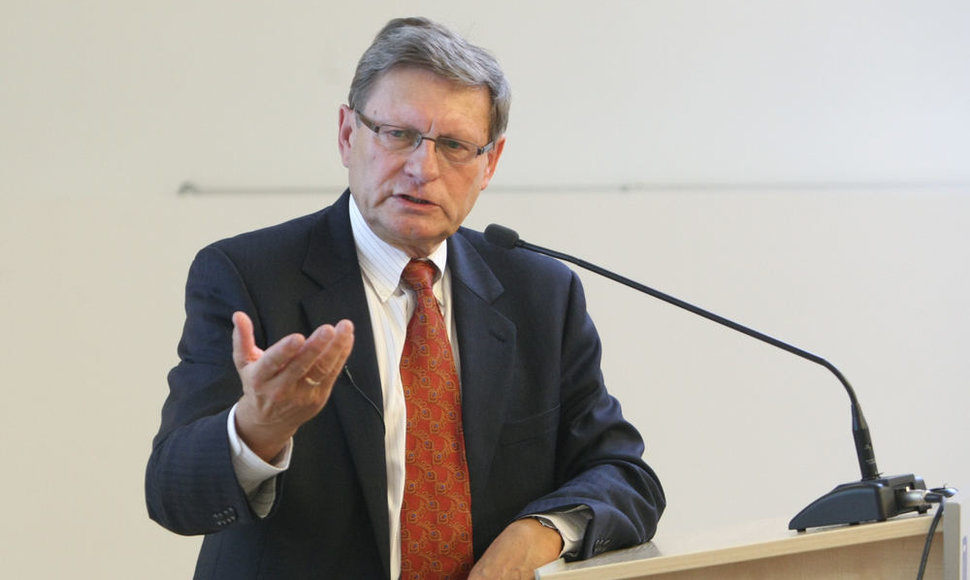Lithuania and Latvia, which had pegged their national currencies to the euro, should also make the final step, i.e. join the euro zone, he said in an interview with BNS on Monday. Estonia adopted the single currency early in 2011.
Balcerowicz talked to BNS while visiting Lithuania at the invitation of the Institute of International Relations and Political Science at Vilnius University.
- After a massive downturn in 2009, the economies of the Baltic countries are growing steadily now. According to the newest data by Eurostat, all three Baltic countries have remained among the leaders in the EU in terms of growth over the recent five quarters. How could you explain such a development?
- The Baltic countries are a model of internal devaluation. This also includes Lithuania. The downturn was due to a huge private credit boom, which went bust. But then the Baltic governments have taken very courageous and needed reforms, including fiscal consolidation and some structural reforms, and it worked. If you contrast this with Greece, you will see that Greece has delayed reforms, Greece did not suffer from the private credit boom, but from systematic fiscal overspending. So I think that the Baltics are a good example for some Western economies, which are still struggling with economic problems, because they are delaying the necessary adjustments.
- Do you think that this trend of economic development in the Baltic countries will continue? For example, analysts project that Lithuania’s gross domestic product (GDP) might grow by 3-to-4 percent next year.
- This very much depends on external environment, because Lithuania, as well as other Baltic countries and most of Central European countries, are small economies. Neither Lithuania, nor Poland can influence what is going on in Germany, for example. The reforms, which make the economies more competitive, are the only good response. I hope that this will continue after the elections in Lithuania. Reforms are the only good solutions to internal and external problems.
- Do you think Lithuania and other Baltic countries, which grew stronger after the crisis of 2009, may resist the current crisis in the euro zone?
- Nobody is absolutely resistant. There is a question of the extent to which the countries are resistant. Neither is Poland resistant, even though we have 38 million people. The question is how you can be more resistant, not totally resistant.
- The Lithuanian government has until now saught to join the euro zone in 2014. Do you think such a target is realistic?
- I have great respect for Lithuania’s Prime Minister Andrius Kubilius and the entire government because of everything they have been doing. I think they are serious guys, especially your prime minister, and they would not propose something that is not realistic. Generally speaking, the Baltic countries are in a different situation than Poland or Hungary, or the Czech Republic, because Lithuania and Latvia are almost in the euro zone because of the euro-based currency support... I think that it makes sense to take the final step.
- How would Lithuania’s economy benefit from entering the euro zone?
- The biggest achievements have already been obtained thanks to stability. As I said, you are almost in the euro zone. The additional ones, if you enter the euro zone, would consist in a greater voice, meaning that not only Estonia and Latvia, but also Lithuania can contribute to the voices of stability in the euro zone, because the euro zone needs discipline, too. And you are examples of necessary discipline.
- What lessons should be taken from the crises?
- First, that fiscal overspending is dangerous not only in the euro zone, but outside the euro zone, too. Second, the delay of structural reforms and letting wages grow faster than productivity ... should be prevented. Third, ... the countries’ monetary policies should be more prudent. Generally speaking, the euro zone’s problems confirm the old truth – bad policies after a while are bad for people. Good policies, even though they may not be very popular in the beginning, are good for people.
***
Balcerowicz is a Polish economist, former Poland’s finance minister (1989-1991) and the chairman of the National Bank of Poland (2001-2007). He is professor at the College of Europe, a member of the board of directors of Peter G. Peterson Institute for International Economics. Balcerowicz also holds honorary degrees (doctor honoris causa) from more than twenty universities in Europe, the US, and Australia.


















